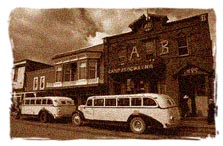|
In 1906, Alaska was given a non-voting delegate in Washington. In 1912, Congress passed a bill written by Judge James Wickersham, making Alaska a territory. Although many Alaskans insisted they deserved to be a full-fledged state, it wasn't until the 1940's that the U.S. government began to seriously consider its statehood. During World War II, the Defense Department constructed military bases and the Alaska Highway. When the Japanese bombed Dutch Harbor and occupied Attu and Kiska islands in 1942, the strategic military people remained in the territory, but adversaries of statehood argued that its population was still too sparse and its location too distant for it to be a state. |
 |
 |
Another argument against statehood was Alaska's lack of a sound economic base. The discovery of oil in 1957 helped the territory leap the final hurdle toward becoming a state. As Alaska's immense wealth of resources was realized, Congress was quickly convinced to disregard past arguments against statehood. On January 3, 1959, President Dwight D. Eisenhower signed into law the 49th state of the union. |

 he
fight for Alaska statehood began in the early 20th century, after
gold rushes in the North brought national attention to Alaska.
Since the Alaska purchase in 1867, Alaska had been under the
jurisdiction of the U.S. Army (1867 - 1877), the U.S. Treasury
Department (1877 - 1879) and the U.S. Navy (1879 - 1884), before
becoming the District of Alaska in 1884 with a territorial
governor appointed by the president of the United States.
he
fight for Alaska statehood began in the early 20th century, after
gold rushes in the North brought national attention to Alaska.
Since the Alaska purchase in 1867, Alaska had been under the
jurisdiction of the U.S. Army (1867 - 1877), the U.S. Treasury
Department (1877 - 1879) and the U.S. Navy (1879 - 1884), before
becoming the District of Alaska in 1884 with a territorial
governor appointed by the president of the United States.